Global Issues
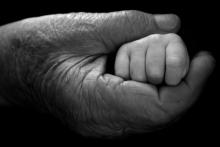
When Becky Morlock was asked to adopt a son from India, she said a prayer. Then she hired a lawyer.
More than four years and a long legal battle later, the one-time missionary has returned to the U.S. as a mom with her son Kyle, who was given to her as a newborn. He was just two days old when his birth mother surrendered him as she was discharged from a hospital in the foothills of the Himalayas.
That was the only time Kyle's two mothers met, and their meeting likely saved his life. It also tested adoption laws in two countries half a world apart.
International adoptions have become more difficult and less frequent with tightening laws aimed to curb child trafficking and adoption fraud. In the last eight years, numbers have dropped from a high of 22,991 in 2004 to 9,319 last year, according the U.S. State Department.
From The Associated Press:
"As many as 100 people are feared dead in an earthquake and landslide that buried more than 20 houses in northern Afghanistan on Monday, officials said.
A group of Episcopal bishops is asking President Obama to help assure that a United Nations agency continues to support a diocese-run hospital in the Gaza Strip.
In a June 6 letter, the 102 bishops ask the president to support funding for Al Ahli Hospital from the United Nations Relief and Works Agency for Palestine Refugees. The letter asserts funding was cut off in May, though an UNRWA official said a final decision has not been made.
The hospital, run by the Episcopal Diocese of Jerusalem, “is the only facility of its sort in the Gaza Strip that is not run by the Hamas government and as such, it is able to provide care without any outside interference or political calculation,” the letter states.
THE ANONYMOUS DEATH threats phoned to Archbishop Pedro Barreto and others in March told them to stop speaking out about the foreign-owned metals smelting plant in La Oroya, Peru.
Barreto, a Catholic archbishop of the Andean region that includes La Oroya, has been a leading advocate for the health of the 35,000-person town, which the plant has made one of the world’s most contaminated places: 99 percent of children there have dangerous levels of lead in their blood.
However, in an unconscionable move made possible by the 2009 U.S.-Peru trade agreement, it is the polluter who claims to be the victim. The massive New York-based holding company Renco Group Inc., whose subsidiary Doe Run Peru owns the smelter, last year filed an $800 million trade-tribunal lawsuit against the Peruvian government, claiming it violated the company’s rights by enforcing environmental regulations in La Oroya.
It’s one of a growing wave of such arbitrations being filed all over the world by extractive-industry foreign investors. In a similar case, the transnational corporation Pacific Rim has filed a $70 million case against El Salvador, after local communities and activists—four of whom have been murdered—opposed gold mining that could contaminate one of the country’s largest rivers.
The suits circumvent nations’ environmental laws by exploiting so-called “investors’ rights” chapters of trade agreements; such provisions are common in bilateral trade agreements, such as the U.S.-Peru pact, and regional agreements such as NAFTA.
The conflict between Israelis and Palestinians is often seen as a conflict between Jews and Muslims. But there are also minority communities of evangelical and other Christians who are caught up in the conflict. This includes Jewish followers of Jesus in Israel who call themselves Messianic Jews and Palestinian Christians in the West Bank. Sadly, the chasm between Messianic Jews and Palestinian Christians is deep. The end-times theology espoused by Messianic Jews can be interpreted in a way that supports the state of Israel at the expense of the Palestinians. At the same time, Palestinian Christians can become so focused on the hardship of living under oppressive military occupation that they forget the justifiable fear of violence that haunts Jewish residents as well.
International Christians, even those who try to honor the dignity of both Israelis and Palestinians, tend to be labeled as siding with one or the other—either with Jews as God’s chosen people or with Palestinians as victims of injustice. In recent years I have been judged by some as leaning too far toward the latter perspective.
In fact, I was severely criticized for speaking at the March 2012 “Christ at the Checkpoint” conference in Bethlehem. Because it was sponsored by Palestinian Christians, some people assumed it was anti-Israel. Prior to the conference, a writer for The Jerusalem Post called me a threat to the state of Israel; and some American Messianic Jews called me a heretic and an anti-Semite.
To be honest, as the conference approached I regretted having agreed to participate. Was it worth the controversy? And what if the conference inadvertently fueled hostility and division? Rarely have I gone into an event so fearful of outcomes and so earnest in praying for God’s intervention.
Julian Pecquet reports for The Hill:
Sen. Chris Coons (D-Del.) said he was “encouraged” by the progress being made and “heartened” by U.S. development investments in LRA-affected communities in northern Uganda. Coons is the sponsor of a bipartisan resolution condemning the crimes against humanity committed by the LRA and supporting ongoing U.S. and regional efforts to capture or kill Kony.
In a new photo series called “A World Journey,” photographer Jim Stipe documents the people that have made an impact on his travels. Particularly in low income countries, Jim exposes the faces and lives that have meant something to him as he journeyed through foreign lands.
On the first slide of his new series, his statement reads:
“I’ve had the privilege of traveling to many countries around the world, sometimes for fun, other times for photo assignments, almost always in low-income countries. Time and again what strikes me most is the strength and dignity of people who often suffer great hardship. This small collection of photos gives you a glimpse of the amazing people I’ve met.”
Take a minute to reflect on some remarkable, beautiful images of the world’s people.
CLICK HERE TO SEE THE E-BOOK.
For Time Magazine, Jay Newton-Small reports on the upcoming G8 summit:
Not since the oil shocks that first brought the world’s superpowers together in 1974–back then they called themselves the “Library Group” because they met in the White House library–has the G8 had so much substantive business on a summit agenda. In recent years, world leaders have mostly just tried to to out-do one another with pledges of development assistance, leading to stories like this one from my colleague Massimo Calabresi, that questioned the usefulness of the annual summit.
Read more about the summit here
For The Atlantic, scholar Michael Fullilove on China's poor human rights record and why it matters:
"China's mixed human rights record is not just bad for its citizens. It is a strategic weakness that complicates its foreign relations and diminishes its soft power. The state's harsh treatment of individuals and minorities regularly disrupts its bilateral relationships. Evidence of internal repression disillusions China's friends and increases the wariness of its neighbors. The human rights issue is a pebble in China's shoe, and the country may never hit its full stride unless it is removed."
Read the full article here
From Agence France-Presse late last night:
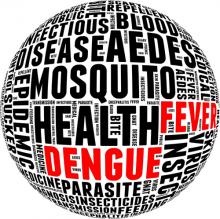
When I moved to Washington, D.C., I—like perhaps most other 20-somethings—imagined this place as a hub of both political thought and non-profit zeal; the coexistence of both worlds, all to change society. Lofty ideals, right? Perhaps.
Ideal, meet the venue Busboys and Poets plus friends and co-laborers in the fight for justice: Faiths Act, ONE, Malaria No More, and the 9/11 Unity Walk. Last night, a handful of musicians and spoken-word artists united in faith and activism under a common cause: World Malaria Day concert for Sierra Leone.
The cars in Cuba fascinate me. Where else in the world can one see a classic 1956 Oldsmobile, a shiny 1957 Chevy, and a 1970 VW bug alongside a new Audi and modern Chinese tour buses?
Our guide said there are four generations of cars in Cuba. First are those pre-revolutionary American cars—the vintage Chevys, Fords, Oldsmobiles, and Studebakers from the 1950s that somehow keep running. Then came the Russian-made Ladas, the small, ugly, square compacts that look like Fiats stripped of any Italian design.
By the ’70s and ’80s, Japanese and other Asian cars started trickling into Cuba, and they became the auto of choice after the fall of the Berlin Wall. Then, in the last decade, the more expensive European cars began showing up. More recently, a fleet of fancy buses, mostly from China, has arrived to shuttle around the 2.5 million tourists now visiting the island each year (and improve public transportation in general).
The cars, of course, reflect the stages of Cuba’s economic relationship with the outside world: the embargo from the U.S., its initial reliance on all things Russian, then growing global trade, followed by the influx of European tourists, and the recent economic resurgence of China.
Cars can now be bought and sold by Cubans. This is one example of dramatic new economic policies, approved last April, being instituted in Cuba. Dr. Osvaldo Martinez, director of Cuba’s World Economy Research Center, called these changes “shock therapy,” like that being experienced by Greece, Spain, and many countries. Cubans should no longer “idolize” the Cuban economic model, Martinez said. Salaries have been increasing faster than productivity. Foods are being imported that could be produced domestically, but weren’t because of the inefficiencies of centralized, Soviet-style agriculture. There has been an “exaggerated number of state employees,” and massive layoffs have been occurring. At times Martinez nearly sounded like a Republican.

Following Pope Benedict XVI's recent trip to Cuba, U.S. Catholic bishops are pushing the State Department to lift the 50-year Cuban embargo in order to improve religious liberty and human rights for the Cuban people.
In a Tuesday (April 17) letter to Secretary of State Hillary Rodham Clinton, Bishop Richard E. Pates of Des Moines, Iowa, the chairman of the bishops' Committee on International Justice and Peace, pressed the Obama administration to pursue “purposeful engagement rather than ineffective isolation” with Havana.
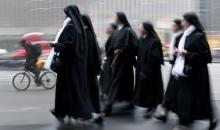
The Vatican has launched a crackdown on the umbrella group that represents most of America's 55,000 Catholic nuns, saying that the group was not speaking out strongly enough against gay marriage, abortion and women’s ordination.
Rome also chided the Leadership Conference of Women Religious (LCWR) for sponsoring conferences that featured “a prevalence of certain radical feminist themes incompatible with the Catholic faith.”
The Vatican’s disciplinary action against the LCWR was announced on Wednesday (April 18), one day before Pope Benedict XVI marked seven years as pontiff.
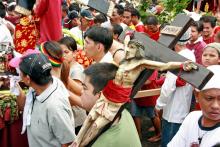
Belief in God is slowly declining in most countries around the world, according to a new poll, but the truest of the true believers can still be found in developing countries and Catholic societies.
The “Beliefs about God Across Time and Countries” report, released Wednesday (April 18) by researchers at the University of Chicago, found the Philippines to be the country with the highest belief, where 94 percent of Filipinos said they were strong believers who had always believed.
At the opposite end, at just 13 percent, was the former East Germany.
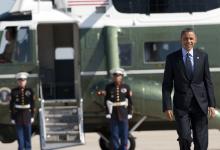
Whatever President Obama does at the upcoming Summit of the Americas in Cartagena, Colombia this weekend may not be front-page news in the U.S—but for many Colombians trying to make an honest living in their homeland, it could just be Obama's "Mission Accomplished" banner moment.
President George W. Bush's May 2003 speech in front of a giant "Mission Accomplished" sign was, to put it mildly, a premature declaration of triumph in the U.S. war with Iraq, an enterprise that was a bad idea in the first place. In Cartagena this weekend, word is that Obama may declare that, after one year of a promised four-year plan, Colombia has met its commitments to crack down on offenses against Colombian workers' rights and lives.
Our friends at the ONE Campaign took traditional April 1 tomfoolery and turned it on its head with the new video "I Predict," that uses humor to drive home a stone-cold sober reality: Within three years, we may very well witness the beginning of the end of AIDS worldwide.

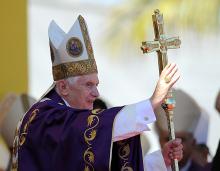
Pope Benedict XVI ended his three-day visit to Cuba on Wednesday (March 28) with an appeal for more religious freedom for the Catholic Church, ahead of a highly anticipated meeting with the island's historic leader, Fidel Castro.
And while he stopped short of openly criticizing the island's communist regime during the trip, Benedict nonetheless said Cuba needed "change" and a "renewed and open society."
The pope celebrated Mass on Wednesday in Havana's Revolution Square for about 300,000 people, according to the Vatican's top spokesman, the Rev. Federico Lombardi.
Cuban President Raul Castro was in attendance and joined in the crowd's applause when the pope entered the stage.

It's ripped from the headlines: A young person is killed, but the police seem to be casting aspersions on the victim. It outrages us when it happens in Florida, and it should outrage us just as much when it happens further south.
It was not one person but five who were found murdered on March 15 in the town of San Isidro, Cauca, Colombia. They had been bound hand and foot and shot in the head. As in the case of Trayvon Martin, race was a factor: the victims were ethnically indigenous.
As I saw for myself when I visited Cauca last year, indigenous people in Colombia are (along with other historically marginalized groups) often stuck between a rock and a hard place —attacked or driven from their homes by both guerrilla insurgents and right-wing paramilitaries, both of which want to control territory and each of which accuses neutral parties of supporting the other side.
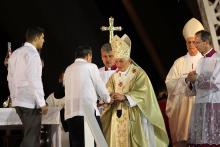
VATICAN CITY--Pope Benedict XVI arrived in Cuba on Monday (March 26), renewing the Catholic Church's pledge to "work tirelessly to better serve all Cubans" as the island strives to "renew and broaden its horizons."
Benedict landed in Santiago de Cuba, east of Havana, arriving from Mexico for the second leg of his weeklong visit to Latin America. President Raul Castro came to personally greet the German pope before Benedict was scheduled to celebrate Mass in the city's Revolution Square.
In his speech during the airport welcome ceremony, Benedict said he carried with him "the just aspirations and legitimate desires of all Cubans," including those of "prisoners and their families."